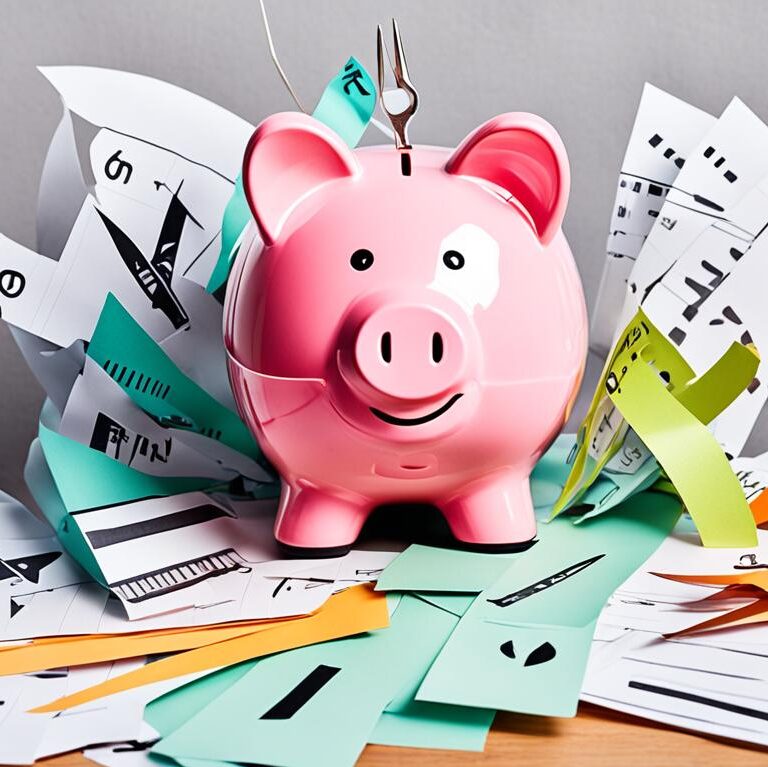“As an Amazon Associate I earn from qualifying purchases.”
Imagine living without the stress of money. Every dollar you earn goes further than you thought. This is frugal living. It’s about spending carefully, using resources wisely, and cutting costs without losing quality. These habits are vital in today’s world.
Think about coming home to a cozy house. The thermostat is perfect, saving you money. Your dinner is not expensive takeout. It’s a healthy meal you cooked. These small changes help a lot with your finances.
Let’s look at Gene. He was struggling but decided to live frugally. Gene cooked at home, used generic brands, and bought quality stuff that lasts. His journey from struggle to success can inspire you too.
Key Takeaways
- Cooking at home can significantly reduce your monthly expenses.
- Turning your thermostat back 7°F to 10°F for eight hours daily can save up to 10% per year on energy bills.
- Opting for generic or store-brand products often provides the same quality at a lower cost.
- Investing in high-quality, durable items can be more economical in the long run.
- Your local library offers free entertainment and resources, helping you save money on books and events.
Create and Stick to a Budget
Setting up a budget is key to managing your money well and living frugally. A good budget shows you where your money comes and goes. It helps you make smart choices about spending and saving. This leads to financial control.
Track Your Income and Expenses
Start by keeping careful track of what you earn and spend. This helps you see clearly how you use your money. You can find areas to save by keeping detailed records. Consider using apps or software to make tracking easier. The goal is to know where every dollar is going, which helps with better financial choices.
Set Realistic Financial Goals
Setting reachable money goals can really help you save more. Begin with small aims, like an emergency fund. Then, set your sights on bigger goals, such as saving for a home or retirement. This strategy gets you into the habit of saving and boosts your willpower.
Having specific savings goals can increase determination and drive. When setting smaller goals, such as getting front-row tickets to a concert or doubling charitable giving, it can help build the habit of saving.
Adjust Your Spending Habits
It’s important to match your lifestyle with your budget. Sort your expenses into needs and wants, and then spend your money wisely. You can start saving by looking for deals, using coupons, and comparing prices. Over time, these steps can save you a lot of money.
| Goals | Savings Tips | Potential Benefits |
|---|---|---|
| Emergency Fund | Automate savings | Prevents debt and financial stress |
| Savings for Fun | Set small goals | Builds the habit of saving |
| Big Purchases | Look for deals, use coupons | Save hundreds or thousands annually |
| Retirement | Utilize 401(k), IRA | Potential for higher returns |
Make it a habit to review your budget often. Adjust it as needed to match your financial goals. Keeping up with your budget like this can make your future more stable and brighter.
Cut Down on Unnecessary Expenses
It’s key to understand how you spend your money. This way, you can keep living well while saving money. Just by looking at where your money goes, you can often find spots to cut back.
Review Subscriptions and Memberships
Keeping track of your subscriptions is important for your budget. Take a regular look at what you’re signed up for. Ask yourself if you really need them. Things like streaming, magazines, and gym memberships can cost a lot each month. Cancelling what you don’t use can save you between $10 to $100 every month.
Opt for Cheaper Entertainment Alternatives
Choosing cheap or free activities is wise for your wallet. Instead of going out to eat, try sharing meals with friends. This can cut dinner costs for two by $80-300. Also, consider activities like hiking or visiting local museums. By doing this, you can save another $15-200 per month.
Save on Utility Bills
Being smart about how much energy you use can save money. Use LED bulbs and make sure to turn off devices not in use. Also, avoid overusing your data plan by doing things like taking shorter showers. These simple steps can save you between $5 to $20 each month.
Learning and using these saving tips leads to better financial management. There are always more techniques to learn. Find out how to cut unnecessary spending for 30 days and improve your financial future.
| Expense | Monthly Savings |
|---|---|
| Cutting Down on Coffee | $60-180 |
| Reducing Dining Out | $32-300 |
| Sticking to a Shopping List | $10-100 |
| Free or Low-Cost Activities | $15-200 |
| Limiting Data Plan Overages | $5-20 |
Save Money on Groceries
Grocery prices are going up. So, finding money saving tips is key. Smart shopping can really help you spend less on food but still eat well.
Plan Your Meals
Planning what you’ll eat in a week is a great way to save money. It stops you from buying things you don’t need. Plus, it cuts down on throwing food away. Try to use one ingredient in a few meals. This way, nothing is wasted and your shopping goes further.

Buy Generic or Store-Brand Products
Picking generic or store-brand food over name brands can save a lot. They’re usually made in the same place but cost less. For example, by choosing generic cereals and bakery products, you could save money.
Utilize Coupons and Cashback Apps
Using coupons and cashback apps is a smart move. They can save you a lot of money at the store. Even credit cards that give you cash back are a good way to cut costs. Don’t forget to check for online coupons regularly.
Food prices have gone up by 11.3% over the year. Dairy has seen a 14% jump.
To shop smarter and save more, keep these tips in mind:
- Don’t shop when you’re hungry. You’ll buy more than you need.
- Buy fruits and veggies when they’re in season. They’re cheaper.
- Use bulk bins for buying just what you need. This avoids waste.
Using these tips in your routine will lower your grocery bill. This means you can stick to your budget and still eat well.
| Product Type | Price Increase | Money Saving Strategy |
|---|---|---|
| Cereals and Bakery Products | 15.6% | Buy Generic |
| Dairy Products | 14% | Use Coupons |
| Produce (Out of Season) | Varies | Buy In Season |
| Meat (Grass-fed vs. Grain-fed) | Up to $4 per pound difference | Choose Grain-fed |
For even more tips on saving money at the grocery store, visit this grocery savings guide.
Embrace DIY and Repairing Instead of Replacing
Change how you deal with everyday items by doing DIY and repairs. This way of thinking helps you save a lot of money. It encourages you to fix, re-use, and upcycle things rather than just throwing them away and buying new ones.
Learn Basic Repair Skills
It’s important to know how to fix basic things to make them last longer. You can learn how to sew on a button or stop a faucet from leaking with easy DIY projects. Knowing these skills saves money and makes you feel more independent.
Repurpose or Upcycle Old Items
Looking for new uses for old items is smart and fun. Upcycling old furniture or decor can turn them into cool and useful pieces. This can lower your spending a lot, saving about 25% on things you might’ve bought.
Utilize Online Tutorials and Resources
The web has tons of tutorials for every DIY project you can think of. From fixing electronics to making your own decor, you can learn it all online. This helps you become more resourceful and independent in your projects.
| Strategy | Potential Savings |
|---|---|
| Learning Basic Repairs | 15% on home repairs |
| Repurposing Items | 25% on household expenses |
| DIY Projects | 50% on post-holiday items |
Using DIY, upcycling, and smart living can save you a lot of money. It changes your habits in positive ways. You spend less and help the environment more.
Use Alternative Transportation Methods
Driving your car daily can quickly add up in costs. Choosing other ways to get around is smart. It saves money and helps the environment.
Walk or Bike for Short Distances
For short trips, walking or biking saves you money. It’s a good way to stay healthy too. These small changes can save you a lot over time.
Take Advantage of Public Transportation
Public transit is a reliable and affordable choice. Most cities have buses, trains, and subways to get around. It’s good for your wallet and the planet.

Carpool to Cut Costs
Carpooling with others is a great way to cut spending. It’s cost-effective because you share gas and parking costs. Plus, it builds stronger community ties and reduces pollution.
| Transportation Method | Benefits | Cost Savings |
|---|---|---|
| Walking/Biking | Health benefits, zero emissions | 100% Savings on transport costs |
| Public Transportation | Reduced carbon footprint, reliable commuting | Up to 70% savings compared to driving |
| Carpooling | Shared expenses, social connections | 50% or more savings on gas and parking |
Turning to walking, biking, public transport, and carpooling can lower how much you spend on travel. This also helps the planet. Choosing these methods is not only good for your wallet but is better for overall health and the world.
Shop Smart for Clothing and Household Items
Being smart in how you spend can lighten your money worries. This is especially true for clothes and things for your home. Try thrift shops, sales, and buy things that last. These steps can make your budget go further.
Buy Secondhand or from Thrift Stores
Finding great deals on quality items is easy when you thrift shop. It saves money and is good for the planet too. Switching to secondhand can cut down the $1800 we spend yearly on non-essentials.
Wait for Sales and Clearance Events
Buying during sales and clearances can save you a lot. By 2024, online sales are expected to reach over $7 trillion. Knowing when to buy helps. Also, holding off on your online cart might bring a discount, stopping you from impulse spending.
Invest in Quality, Long-Lasting Items
Getting things that last longer saves money in the end. These items might cost more at first, but they save you from buying replacements often. It’s a way to be budget-wise. Research shows valuing how long something lasts can make people spend less.
Boost Your Income with Side Hustles
In today’s world, making extra money is smart. You can find gigs online or start small businesses to bring in more cash. This not only boosts your income but also makes you more financially secure.

Explore Freelance Opportunities
Freelancing lets you use your talents to earn extra. Websites like Upwork and Fiverr help you find jobs. Imagine turning a $66,000 salary to making over $300,000 a year by starting a side business. This is what one person did.
Sell Unwanted Items
Selling old stuff can tidy up your home and your finances. Try eBay, Poshmark, or local sales for things you no longer want. It’s a fast way to make money on the side.
Find Part-Time or Remote Work
Looking for part-time or online jobs is also a good idea. Sites like Indeed and Remote.co have loads of job options. This extra work can supercharge your savings and help you get ahead faster.
Those in the lowest income bracket spend about $900 more than their income each month. Finding extra jobs can fill this gap and make you more financially stable.
| Income Bracket | Average Monthly Spending | Percentage of Income |
|---|---|---|
| Bottom 20% | $1,947 | 100%+ |
| 20th – 40th Percentile | $2,726 | 40% Higher |
| Top 20% | $87,388 (saved) | Around 50% Saved |
Conclusion
Stephen Covey’s “The 7 Habits of Highly Effective People” can help us with our money. Living frugally means handling today’s money challenges well without losing your lifestyle quality. The goal is to be proactive and focus on your money aims to build financial discipline. This focus cuts down on extra costs and helps you reduce debt.
Creating and sticking to a budget is key. It lets you keep a close eye on what you make and spend. This smart step is crucial for saving money and ensuring your financial future is secure.
Cutting out unnecessary costs and getting creative with your money is next. Talking to financial experts or joining support groups can show you new ways to handle your finances. It’s important to watch how you spend and adjust when needed to improve your financial discipline.
Increasing your income through part-time work or freelancing can also help. These extra money-making activities speed up your savings. Slowly but surely adopting these habits will lead you to a prosperous financial future and better debt reduction.
Additional Frugal Habits for Greater Savings
If you’re already into smart spending, trying out more money-saving techniques is a good idea. Embracing frugality like cooking at home helps cut costs on food. This is great for those who eat out a lot. It also makes you eat healthier. You can know exactly what you’re putting in your body.
Making small changes in your daily life can save you big bucks. For instance, lowering your thermostat a bit can drop your yearly heating and cooling costs by 10%. Choosing cheaper store-brand stuff over big names can save you a lot. Most times you won’t even notice the difference in quality.
Cutting your entertainment budget can also help you save more. Use your library more for books, movies, and audiobooks. Try not to buy things on a whim. Waiting a short while can stop you from buying things you don’t really need. This leads to smarter buys and saves you money.
Buying quality items that last longer is a smart move. They usually don’t break often, saving you cash over time. Shopping for used stuff like clothes or furniture can also cut your spending. These extra frugal tips help you save more, living well on a budget.
FAQ
What are the essential steps to creating a budget?
How can I cut down on unnecessary expenses?
What are some effective ways to save money on groceries?
Why is embracing DIY and repairing instead of replacing beneficial?
What alternative transportation methods can help save money?
How can I shop smart for clothing and household items?
What are some ways to boost my income with side hustles?
What are some additional frugal habits for greater savings?
Source Links
- https://www.experian.com/blogs/ask-experian/frugal-habits-to-save-money/
- https://finance.yahoo.com/news/7-frugal-habits-clark-howard-160019145.html
- https://parknationalbank.com/7-habits-to-make-you-an-effective-saver/
- https://www.bankrate.com/banking/savings/ways-to-build-good-money-habits/
- https://bettermoneyhabits.bankofamerica.com/en/saving-budgeting/ways-to-save-money
- https://theeverygirl.com/cut-unnecessary-spending-for-30-days/
- https://www.bankrate.com/banking/savings/ways-to-save-money-on-groceries/
- https://embracingsimpleblog.com/money-wasting-habits-ive-given/
- https://www.scu.org/11-frugal-habits-to-save-money-in-everyday-life/
- https://www.uhfcu.com/quick-tips/7-habits-of-highly-frugal-people/
- https://www.newtraderu.com/2024/05/11/7-practical-tips-to-reduce-your-cost-of-living-and-save-money-with-frugal-living/
- https://www.forbes.com/advisor/banking/savings/clever-ways-to-save-money/
- https://www.nerdwallet.com/article/finance/how-to-save-money
- https://www.thesimplicityhabit.com/stop-buying-things-you-dont-need/
- https://bestlifeonline.com/smart-shopping-habits/
- https://doablesimplicity.com/smarter-online-shopping-habits/
- https://moneywithkatie.com/blog/how-to-increase-income-the-best-way-to-save-more
- https://www.sidehustleweekend.com/post/habits-in-side-hustle-journey
- https://washingtonnational.com/explore/your-life/7-helpful-habits-to-boost-savings/
- https://www.cervellofp.co.uk/2023/06/02/how-stephen-coveys-7-habits-applies-to-our-financial-life/
“As an Amazon Associate I earn from qualifying purchases.”

